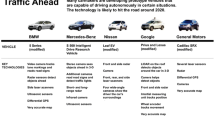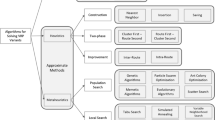Abstract
Demand-Adaptive Systems (DASs) display features of both traditional fixed-line bus services and purely on-demand systems such as dial-a-ride, that is, they offer demand-responsive services within the framework of traditional scheduled bus transportation. A DAS bus line serves a given set of compulsory stops according to a predefined schedule, which specifies the time windows associated with each stop, and thus provides the traditional use of a transit line without reservation. On the other hand, passengers may issue requests for transportation between two optional stops, inducing detours in the vehicle routes. The design of a DAS line is a complex planning process that requires to select the compulsory stops and to determine its master schedule in terms of the time windows associated with the compulsory stops. In this paper, we focus on determining the master schedule for a single DAS line. We propose a mathematical description and a solution method based on probabilistic approximations of several DAS line core characteristics. Results of numerical experiments are also given and analyzed.
Similar content being viewed by others
References
Carpaneto, G., Dell’Amico, M., & Toth, P. (1995). Exact solution of large-scale, asymmetric traveling salesman problems. ACM Transactions on Mathematical Software, 21(4), 394–409.
Ceder, A., & Wilson, H. M. (1997). Public transport operations planning. In C. ReVelle, & A. E. McGarity (Eds.), Design and operation of civil and environmental engineering systems (pp. 395–434). New York: Wiley.
Cordeau, J.-F., & Laporte, G. (2003). The Dial-a-Ride Problem (DARP): variants, modeling issues and algorithms. 4OR, 1(2), 89–101.
Crainic, T. G., Malucelli, F., & Nonato, M. (2000). A demand responsive feeder bus system. In CD-ROM of 7th World congress on intelligent transport systems, 7WC-ITS. Torino, Italia.
Crainic, T. G., Malucelli, F., & Nonato, M. (2001). Flexible many-to-few + few-to-many = an almost personalized transit system. In Preprints TRISTAN IV—Triennial symposium on transportation analysis (Vol. 2, pp. 435–440). Faculdade de Ciências da Universidade de Lisboa and Universidade dos Açores, São Miguel, Açores, Portugal.
Crainic, T. G., Malucelli, F., Nonato, M., & Guertin, F. (2005). Meta-heuristics for a class of demand-responsive transit systems. INFORMS Journal on Computing, 17(1), 10–24.
Crainic, T. G., Errico, F., Malucelli, F., & Nonato, M. (2007). Towards designing flexible transportation systems. In Proceedings of the triennial symposium on transportation analysis. TRISTAN VI, Phuket Island, Thailand.
Crainic, T. G., Errico, F., Malucelli, F., & Nonato, M. (2008). Designing the master schedule for demand-adaptive transit systems. In Proceedings of the 7th international conference on the practice and theory of automated timetabling, CD-ROM. CIRRELT, Montréal, Canada.
Desaulniers, G., & Hickman, M. D. (2007). Public transit. In C. Barnhart & G. Laporte (Eds.), Handbooks in operations research and management science : Vol. 14. Transportation (pp. 69–127). Amsterdam: North-Holland.
Errico, F. (2008). The design of flexible transit systems: models and solution methods. Ph.D. thesis, Politecnico di Milano, Italy.
Hall, C. H. (2006). A framework for evaluation and design of an integrated public transport system. Ph.D. thesis, Linkopings Universitet, Sweden.
Hickman, M., & Blume, K. (2001). Modeling cost and passenger level of service for integrated transit service. In S. Voß& J. R. Daduna (Eds.), Lecture notes in economics and mathematical systems : Vol. 505. Computer-aided scheduling of public transport (pp. 233–251). Berlin: Springer.
Horn, M. E. T. (2002). Multi-modal and demand-responsive passenger transport systems: a modelling framework with embedded control systems. Transportation Research A, 36, 167–188.
Ioachim, I., Desrosiers, J., Dumas, Y., & Solomon, M. M. (1995). A request clustering for door to door handicapped transportation. Transportation Science, 29(1), 63–68.
Malucelli, F., Nonato, M., & Pallottino, S. (1999). Some proposals on flexible transit. In T. A. Ciriani, E. L. Johnson, & R. Tadei (Eds.), Operations research in industry (pp. 157–182). New York: McMillian.
Malucelli, F., Nonato, M., Crainic, T. G., & Guertin, F. (2001). Adaptive memory programming for a class of demand-responsive transit systems. In S. Voß& J. R. Daduna (Eds.), Lecture notes in economics and mathematical systems: Vol. 505. Computer-aided scheduling of public transport (pp. 253–273). Berlin: Springer.
Parragh, S., Doerner, K., & Hartl, R. (2008). A survey on pickup and delivery problems. Part II: transportation between pickup and delivery locations. Journal für Betriebswirtschaft, 58(2), 81–117.
Quadrifoglio, L., Dessouky, M. M., & Palmer, K. (2007). An insertion heuristic for scheduling mobility allowance shuttle transit (mast) services. Journal of Scheduling, 10(1), 25–40.
Toth, P., & Vigo, D. (1996). Fast local search algorithms for the handicapped persons transportation problem. In I. H. Osman & J. P. Kelly (Eds.), Meta-heuristics: theory & applications (pp. 677–690). Norwell: Kluwer Academic.
TRB (2004). Operational experiences with flexible transit services (TCRP Synthesis Report, Vol. 53). Transportation Research Board.
Author information
Authors and Affiliations
Corresponding author
Rights and permissions
About this article
Cite this article
Crainic, T.G., Errico, F., Malucelli, F. et al. Designing the master schedule for demand-adaptive transit systems. Ann Oper Res 194, 151–166 (2012). https://doi.org/10.1007/s10479-010-0710-5
Published:
Issue Date:
DOI: https://doi.org/10.1007/s10479-010-0710-5




